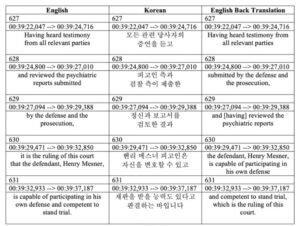by Elena Chang
A Korean subtitler would have no problem translating the French sentence “On peut se tutoyer?” into Korean because both languages make clear distinctions between honorific (존댓말) and intimate styles (반말).
This difference is largely visible in verb endings.
French: On peut se tutoyer?
Korean: 반말 써도 되요? or 말 놓아도 되나(요)?
English back translation of the Korean: Mind if I use intimate verb endings?
Stefan Huyghe’s article (https://multilingual.com/on-peut-se-tutoyer-the-impossible-task-of-conveying-complex-concepts-in-limited-space/) reminds me of my recent struggle providing Korean subtitles for a well-known U.S. police procedural. Admittedly, at first I was excited to receive a higher rate than the industry standard.
But I completed only three episodes of the five initially discussed because it eventually dawned on me that my time and effort were inadequately compensated. Here’s how I reached this conclusion.
Thankfully, English templates were provided. However, turning those English captions into Korean subtitles turned out to be way more complicated than I had expected due to the following two major issues.
First, had I been providing subtitles for the series since its beginning, I would have been familiar with the relationships between the principal characters, the scores of detectives, and other law enforcement personnel. I could have precisely expressed subtle but palpable tonal shifts depending on the degree of formality amongst them in a given setting. Korean people have a highly developed sense of hierarchy, which is vividly reflected in their language. A translator cannot just randomly select casual or formal tones when converting dialogue into Korean.
The crucial decision I had to make was what tone and verb endings to use between two principal characters whose police careers began about the same time, but now one is the other’s boss.
Though they are colleagues and get along well, a subordinate is not supposed to sound intimate in a formal setting, especially when other officers are present, as they often are.
Beyond that, when a district attorney or medical examiner joins the group, translation is further complicated because in Korea, prosecutors or doctors are ranked a cut above “street cops”, regardless of age. Now the real headache: said prosecutor was once a cop himself, and part of this team! How does one convey all this in subtitles? “Colleagues” are thought to be equal or even chummy, when in actuality they’re different strata of a social hierarchy. Trying to have these labyrinthine relationships properly presented for a Korean audience became, yes, tear-your-hair-out agony. After spending way too much time (and having my hourly rate plunging below minimum wage) on three episodes (123 minutes total) to tackle this near-impossible task, I had to beg off the remaining two episodes even though I would’ve enjoyed watching them very much!
Secondly, fundamental grammatical differences between English and Korean make it impossible to translate either word for word or phrase for phrase as sometimes works between English and another European language.
As in English, Korean sentences do begin with a subject; however, unlike English, the verb comes at the very end with everything else crammed in between! Thus, long, run-on sentences—imagine something like an expert witness’s long-winded testimony or a Shakespearean monologue—spanning several subtitles must be translated as a whole first, and then carefully divided to fit each subtitle within given character limits. This can be seen in the example below. Such complication makes English to Korean subtitling even more time-consuming, further reducing my rate.

Overall, I am quite proud of my Korean subtitles for those three episodes. Now the stories and characters can be understood and enjoyed by Korean viewers in the same way their English-speaking counterparts do.
I love audiovisual translation, but I cannot allow my love of the medium to result in professional exploitation. Fortunately, I have other types of work to earn a living. For the sake of our profession, however, this shameless exploitation must cease. Otherwise, the capable and competent will abandon this trade for greener pastures. Who will be the ultimate losers? Not merely the audience but the filmmakers and content creators whose work is marred and butchered because bean counters are hell-bent on saving a few pennies. And all so that media bosses can buy a bigger yacht, or another mansion.

